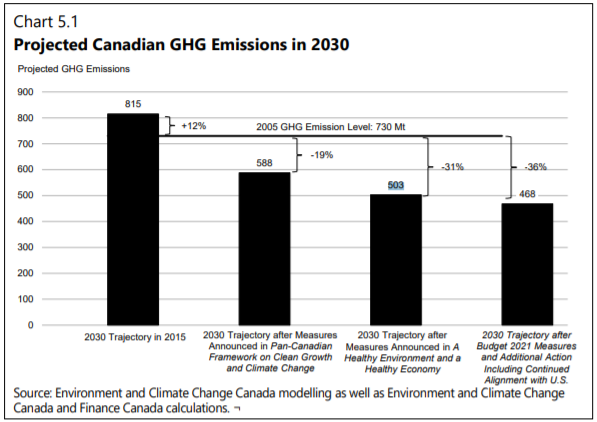Thinking through the exercise of setting climate targets, and our announcement today.
In many ways, it& #39;s both ambitious and achievable, and builds on our meaningful progress to date.
But it& #39;s also worth thinking about what more we need to do. (thread)
In many ways, it& #39;s both ambitious and achievable, and builds on our meaningful progress to date.
But it& #39;s also worth thinking about what more we need to do. (thread)
To start, let& #39;s assess where we were when we came to office in 2015. Projected 2030 emissions stood at 815 Mt.
By the time we went the polls in 2019, those 4 years of policy-making had bent the curve to 2030 by 25% to around 600 Mt.
By the time we went the polls in 2019, those 4 years of policy-making had bent the curve to 2030 by 25% to around 600 Mt.
Important progress, but still short of our then target of 523 Mt.
In the 2019 platform, we committed to the goal of net zero by 2050, in keeping with the science and IPCC& #39;s call to action, and also committed to exceed our 2030 target but without specificity.
In the 2019 platform, we committed to the goal of net zero by 2050, in keeping with the science and IPCC& #39;s call to action, and also committed to exceed our 2030 target but without specificity.
Our updated climate plan released in December took us to 503 Mt by 2030, the first time any federal government in Canada credibly set out a plan to meet an existing target (and also represented a 38% reduction from projected emissions when we took office in 2015).
This past week, Budget 2021 included additional measures that are estimated to take us down to 468 Mt. This blows past the existing 2030 target (as noted in the chart below), and represents a 42.5% reduction against the 815 Mt projected emissions when we took office in 2015.
Our new target is to reduce emissions by 40% to 45% below 2005 levels.
It& #39;s significantly more ambitious than our current target, and it& #39;s also achievable in that existing measures that get us to 36%.
At the upper end, it means roughly 400 Mt (a 50%+ cut from BAU in 2015).
It& #39;s significantly more ambitious than our current target, and it& #39;s also achievable in that existing measures that get us to 36%.
At the upper end, it means roughly 400 Mt (a 50%+ cut from BAU in 2015).
By comparison, apply the IPCC& #39;s call for a 45% reduction in 2010 levels at the national level = 380 Mt (or a 48% reduction as against 2005)
The Paris Agreement contemplates that parties will ratchet up ambition, so I see our new target as yet another step on a longer path.
The Paris Agreement contemplates that parties will ratchet up ambition, so I see our new target as yet another step on a longer path.
Of course, as the IPCC& #39;s @JoeriRogelj explains on the #uncommonspod, science can& #39;t translate the physics of a global target to the national context. One needs to consider ideas of fairness too, including those that militate for and against ambition. https://uncommons.ca/2020/12/20/episode-58-climate-ambition-with-joeri-rogelj/">https://uncommons.ca/2020/12/2...
As we think through fairness in Canada, there are good arguments for greater ambition, including how much we& #39;ve benefitted (and continue to benefit) from fossil fuels and our wealth.
But there are also real challenges around feasibility and a just transition given our economy.
But there are also real challenges around feasibility and a just transition given our economy.
In the end, what& #39;s most important is whether we are setting goals and taking action to put us on a credible path to net zero, and I think the announcement today helps to move us toward that.
We have come a long way since 2015, but the work isn& #39;t done yet.
We have come a long way since 2015, but the work isn& #39;t done yet.
As a side note here, @andrew_leach makes a compelling case for avoiding target bingo and focusing squarely on strong policy action. He also rightly notes that we& #39;d see dramatic reductions in global emissions if the world followed much of our policy lead. https://www.cbc.ca/news/canada/calgary/road-ahead-climate-summit-emissions-reduction-targets-andrew-leach-1.5996887">https://www.cbc.ca/news/cana...
On the question of where we go from here, a few thoughts:
1. While we& #39;ve seen major new announcements in December and in the budget, we will need to turn our minds to the additional policy action that will undoubtedly be required to take us to the upper end of our new target.
1. While we& #39;ve seen major new announcements in December and in the budget, we will need to turn our minds to the additional policy action that will undoubtedly be required to take us to the upper end of our new target.
2. As Dr. Rogelj notes in our conversation, if it isn& #39;t feasible to further reduce emissions by 2030, but we believe we have a bigger role to play given our wealth and the benefit accrued from fossil fuels, then we should contribute more to international climate action.
3. Another idea from Dr. Rogelj, but to help ensure we don& #39;t discount what is possible in Canadian politics, a citizen& #39;s assembly could have great value in assessing the possibilities of additional climate action. See the UK Climate Assembly, for example: https://www.climateassembly.uk/ ">https://www.climateassembly.uk/">...
4. Lastly, we could amend C-12 to require that our new 2030 target is re-assessed at a certain future date, both to formalize the ratcheting up process the Paris Agreement contemplates, but also to ensure the expert advisory body and accountability measures have a role to play.
That& #39;s a long way of saying that I think it was a good day for ambitious climate action in Canada, we continue to build on our meaningful progress in setting a credible path to net zero, but there is unquestionably more work to do.

 Read on Twitter
Read on Twitter


